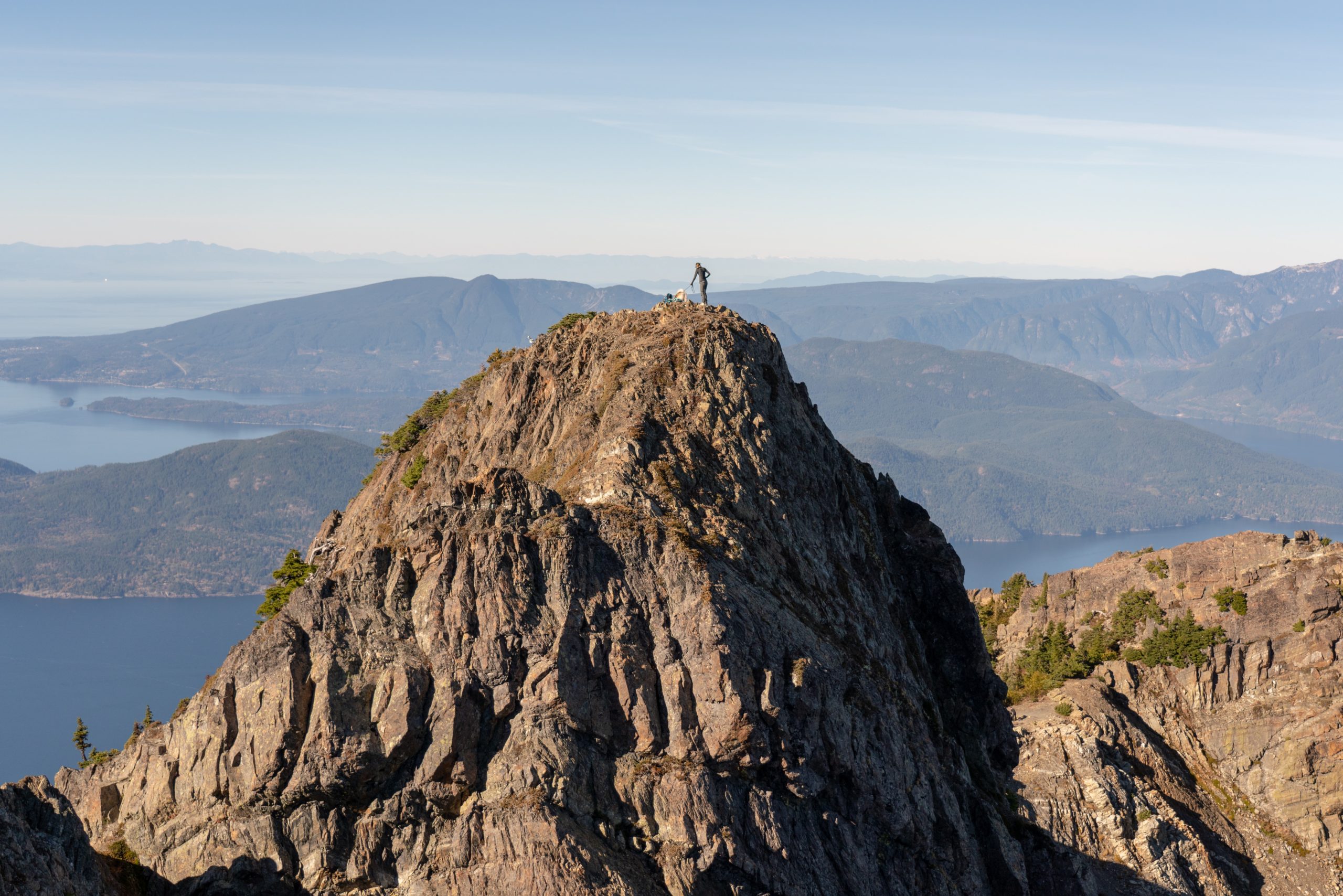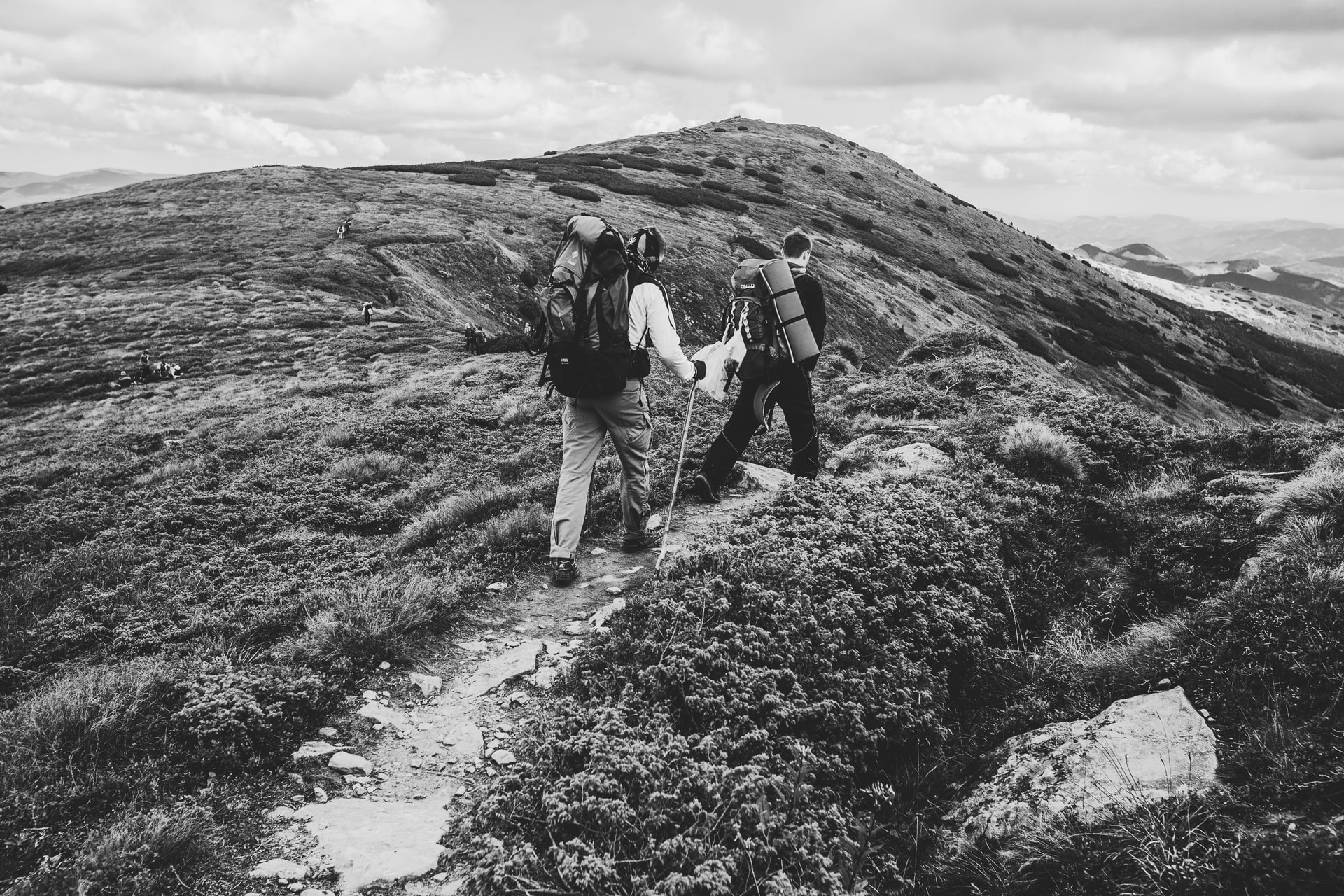Get Lost: How to Lose Someone On the AT
Note: This post was originally written in 2015 and has since been updated. The “tips” included in the following post were written under the context of a normal hiking season. It should go without saying, we don’t encourage anyone to thru-hike the AT, or any trail, until approval has been granted by the corresponding trail organizations.
Each year, the Appalachian Trail sees an increase in people attempting to thru-hike. After the starting pistol of early April, you might feel a like you’re in a long distance race. Slowly, though, people will drop out, slow down, or speed up. Then one day, the loneliness of thru-hiking finally hits you. The chattering of angry squirrels becomes your main interaction for the day, and you begin to feel a little crazy. Soon, you find yourself thinking that you would do anything for human companionship.
And then you meet the one person you can’t stand.
They have every bad habit in the book. They are loudly opinionated and don’t agree with you on anything. They snore, chew loudly, and make this whistling noise with their nose when they breathe that makes you want to impale them with your trekking pole.
So what do you do to avoid a homicidal trail-ender? You find a way to lose them.
Losing people on trail is nothing new. Bill Bryson famously chronicled his own experience trying to avoid the unbearable ‘Mary Ellen’, where he and his hiking partner Katz hitched into town to hide. Jenn Pharr Davis told the audience during a TED talk about her own experience dodging another hiker, in which she hid under a Rhododendron bush: “I was out there lying in the dirt trying to avoid the only human contact within miles.”
You might wonder, though, how you can lose someone? That can be a tricky and socially awkward endeavor. Sometimes, it’s easy – if that person doesn’t get along with you, chances are you both want to lose each other. But what if that person doesn’t take a hint? Maybe they’re nervous about hiking alone, or maybe they just don’t realize that the two of you have nothing in common.
In that case, this is the thru-hiker playbook for detaching those pesky barnacles from your hiker hull:
1. Be Direct
We all know that by far the best way to ‘lose someone’ is to just tell them you want to hike alone. To be fair, Davis told her anecdote about the Rhododendron bush in order to highlight what she should have done: be honest. Candor can save you a lot of effort and plotting, but it can also be pretty awkward.
2. The Old ‘Hike and Hide’
The most popular strategy, the hike and hide is a classic. It involves telling your unwanted companion that you plan to hike a big day – say 20 miles or so. Then, you get up extra early to head out and pull off the trail in about a mile. Set up camp and hang out, giving yourself some much-needed rest time. The next day, start out again and do a few short days, all the while keeping track of your friend in the shelter logs.
Sneaky? Yes. Duplicitous? Of course. Difficult? No. This is probably the easiest way to lose someone, as long as you don’t mind sacrificing a little pride.
3. Change Your Pace
You might assume, based on everything that you know about socialization, that your hiking partners will be determined by how well you get along, what you have in common, or how well your personalities mesh. But on the trail, none of that matters. The one thing that will actually decide who you hike with is simple: how fast or slow you hike.
If you find yourself hiking with someone you can’t stand, this might be the time to start hiking those 20 mile days you’ve been talking about doing. Or, take a chance and try slowing way down. Feign Lyme disease, if you have to. Depending on how determined your new friend is, they might just give up and hike ahead.
4. Teleport
I did meet hikers who teleported. One day they were in Southern Virginia hiking with someone they really didn’t want to hike with, and the next day they were halfway to Pennsylvania, waving goodbye to a good Samaritan with a pick up truck. Sometimes, desperate times merit desperate measures. While I don’t personally condone changing your hike for another person, it has been done. People have even driven backwards along the AT or flip-flopped in order to lose a hiking partner.
5. Find a New Hiking Partner
Group dynamics are complicated. Sometimes, adding on a new hiking partner can change the flow of a group, for better or worse. During my own thru-hike, adding a new member was one of the more common reasons that I saw hiking groups break up or change. Of course, this only works when there is someone else in your vicinity hiking the same way. But I recommend giving it a try, even if it means adjusting your pace for a day or two. At the very least you’ll have someone else to talk to.
Some of you may find this list juvenile – which it is – but no matter how down-to-earth we all think we are, we often behave differently in the middle of an awkward social situation. Of course direct communication is always better than passive maneuvers, but it’s hard to say something – no matter how honest it is – that might hurt someone’s feelings. I myself have been ‘lost’ before, and in turn have ‘lost’ people. The trail is random, strange, and unexpected, and honestly I learned a lot from hiking with people I didn’t see eye-to-eye with.
For the first time for many of us, the AT is a chance to eschew regular communication with friends that we have ‘vetted’ already, and embrace daily conversations with people who challenge our beliefs, offend us, and say things that go way beyond our comfort zones. At times I found myself hiking with people all day who I completely disagreed with – and these experiences were so important to my development. So sure, you could lose someone with the suggestions above. Or, you could give them another chance to broaden your mindset, strengthen your own convictions, or just realize that they can actually be a lot of fun to talk to.
Keep in mind that before you lose someone, it’s good to know what you’re losing.
This website contains affiliate links, which means The Trek may receive a percentage of any product or service you purchase using the links in the articles or advertisements. The buyer pays the same price as they would otherwise, and your purchase helps to support The Trek's ongoing goal to serve you quality backpacking advice and information. Thanks for your support!
To learn more, please visit the About This Site page.





Comments 5
Maggie
I live in the Seattle area and would love to meet you while on the PCT. I’ll be your “Angel” if our schedules coincide. As you get into Washington, contact me.
You don’t know what you’ve got till it’s gone….in the old days I can remember being glad just to see someone else on the trail, anyone! But with the popularity of the Trail these days it is difficult to find the peaceful quiet of being with yourself. The AT hasn’t always been a purely social experience, it was once a communion with nature…an experience with solitude, an escape from the nonsense of life. Not saying that the AT experience today is not still fabulous, it is, only that it is different. People slog along with their heads down, ear plugs in blasting away the latest play list, destroying the sounds of silence. From town to town, from shelter to shelter, from zero to zero,from party to party. Pushing to make “big miles” day after day it seems that many people miss too much of what the AT really is….a wilderness adventure. Have we become so involved with what other people think of us or we of them that we have methods of dodging or ditching others without hurting their feelings? If you are afraid of being alone, stay home. If you judge others by appearances or attitude and seek only people that believe as you do, stay home. If my comment offends you, I apologize.
I would just say that I came on this trail to get my mind and life sorted out and I need to do it alone if it’s okay with them.
If I don’t remember this happening it probably means this was me, right?
I rarely sleep at shelters. Never did the AT hikes I took. The reason I hike is to get away from crowds. Unfortunately, and in some ways fortunately, I live in East Africa where there are few trails and even where trails exist there are some wild animals. Caution is best with them. Even saw a leopard at 11,500 feet on my way up 17,000+ foot Mt Kenya and elephants at about 9500 feet. However — I plan on thru hiking the AT at my advanced age…. And I plan on being alone as I possibly can. I’m not a misanthrope, in fact I love people. But on the trail I just love solitude. I’m sure I’ll run into wonderful folks on the trail, but I prefer waking up to silence by myself. Just the sounds of nature. I realize that the majority of hikers on the AT seem to prefer the company of others, and the camaraderie. I won’t avoid people, but will try to avoid crowds.